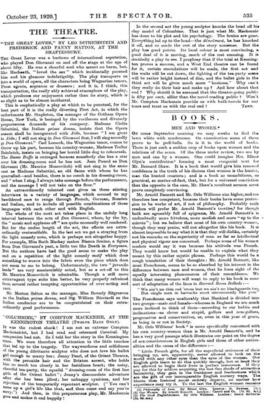THE THEATRE.
" THE GREAT LOVER," BY LEO DITRICHb'TEIN AND FREDERICK AND FANNY HATTON, AT THE SHAFTESBURY.
THE Great Lover was a baritone of international reputation, who played Don Giovanni on and off the stage at the age of about fifty. He was a cheerful soul who meant no harm, but, like Maoheath, " loved the sex " which incidentally pursued him and his glamour indefatigably. The play transports us Into a world of opera, all the characters being Wagnerian tenors, Press agents, sopranos or dressers ; and it is, I think, this transportation, the really ably achieved atmosphere of the play, which produces our enjoyment rather than its story, which is so slight as to be almost incidental.
This is emphatically a play at which to be punctual, for the best part of it is the really diverting First Act, in which the unfortunate Mr. Stapleton, the manager of the Gotham Opera House, New York, is besieged by the vociferous and diversely preposterous demands of his company. Madame Giulia Sabattini, the Italian prima donna, insists that the Opera season shall be inaugurated with Aida, because " I am great in Aida; I will not sing in Don Giovanni first, I will sing secondly in Don Giovanni." Carl Losseck, the Wagnerian tenor, comes to throw up his part, because his country-woman, Madame Treller Beinbrioh, insists on bringing her horrid little dog to rehearsals. The Basso Buffo is outraged because somebody else has a star over his dressing-room and he has not. Jean Paurel as Don Giovanni (Mr. Maurice Moscovitch) will not sing in the same cast m Madame Sabattini, an old flame with whom ho has quarrelled—and besides, there is no couch in his dressing-room, and " when I sing, I always take massage before the performance, and the massage I will not take on the floor."
An extraordinarily talented cast gives us these stirring interviews in a variety of languages, which seemed to my bewildered ears to range through French, German, Russian and Italian, and to include all possible combinations of these languages with each other and with English.
The whole of the next act takes place in the unduly long interval between the acts of Don Giovanni, where, by the by, the " music and applause off " are quite unusually well rendered. But for the undue length of the act, the effects are extra- ordinarily vraisemblable. In the last act we get a straying from the light comedy note, which is perhaps not altogether happy. For example, Miss Ruth Mackay makes Bianca Sonino, a figure from Don Giovanni's past, a little too like Death in Everyman. But the authors have had the good sense to make the play end on a repetition of the light comedy motif which does something to weave into the fabric even the piece which does not seem to me to belong. Unfortunately, the two " juvenile leads " are very amateurishly acted, but as a set-off to this Mr. Maurice Moscovitch is admirable. Though a still more extravagant type traits him better, he very properly refrained from several rather tempting opportunities of over-acting and rant.
Mr. Morton Belton as the manager, Miss Beverly Sitgreaves as the Italian prima donna, and Sig. William Ricciardi as the Italian conductor are to be congratulated on their extra- ordinarily good performance.


































 Previous page
Previous page